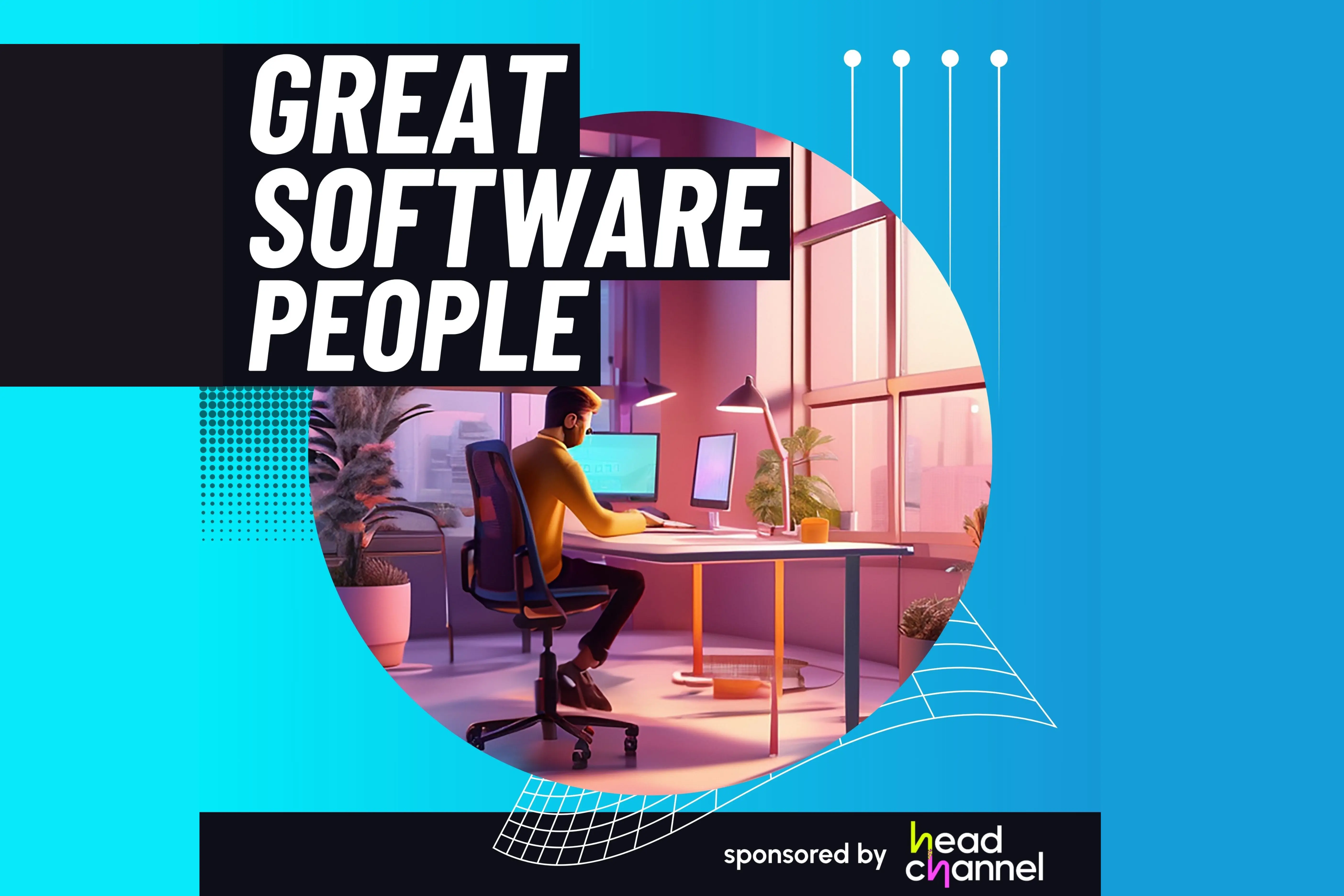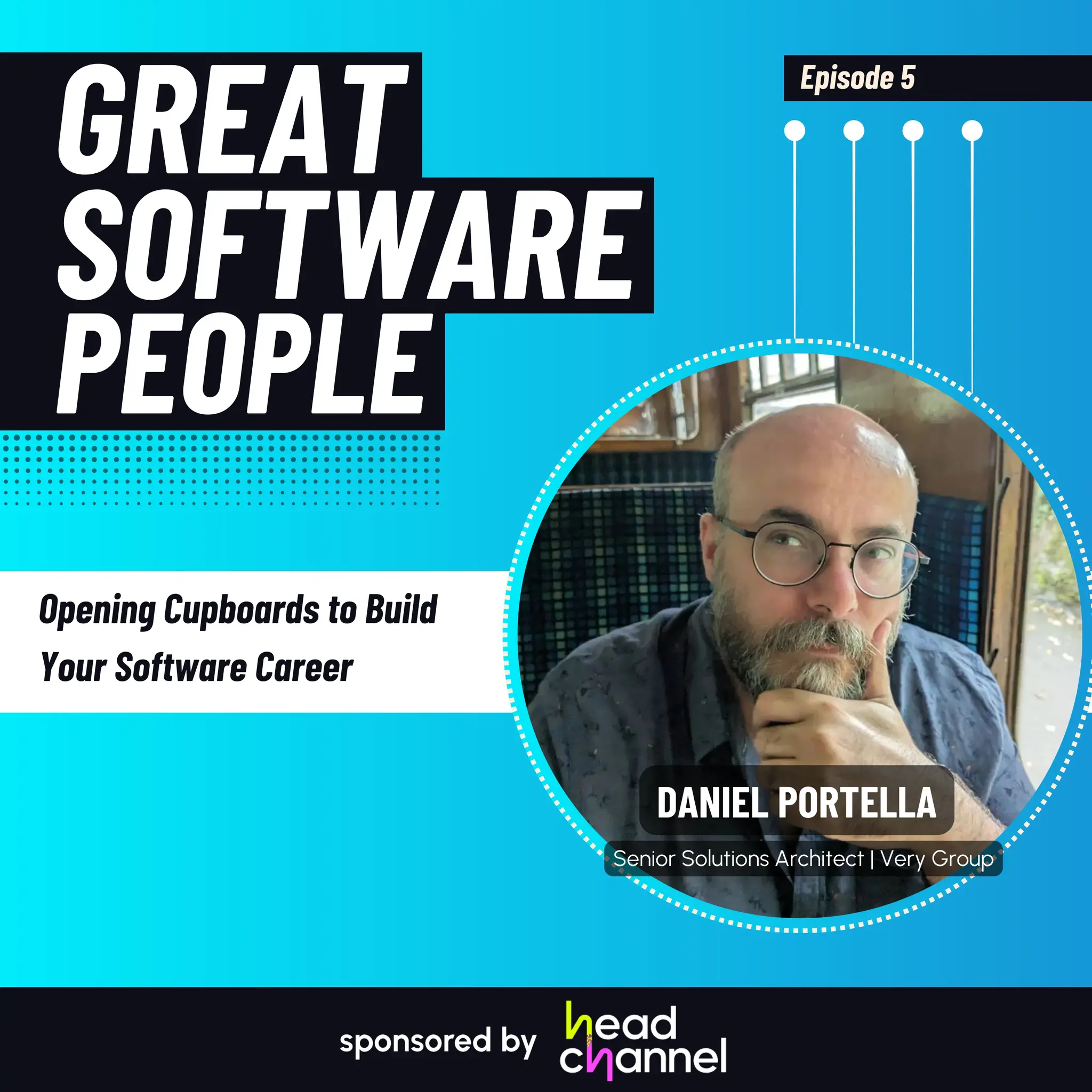
Opening Cupboards to Build Your Software Career with Very Group’s Senior Solutions Architect, Daniel Portella - E5
On this week’s episode of Great Software People, Richard interviews Daniel Portella, someone who he has worked alongside for many years across a variety of different industries and brands.
This engaging episode of Great Software People follows the career journey of Daniel Portella, from his start in software development to becoming a Senior Solutions Architect.
Gain insightful perspectives from Dan’s diverse experiences from working in Finance, Legal and Digital Media to his time as a Principal Developer and Architect. Dan shares fascinating stories about high-pressure projects and offers valuable lessons learned.
This episode includes:
-
Growing a career at brands such as Laterooms.com, Moonpig, Cohaesus and Very Group
-
Implementing and customising innovative technologies
-
The fast-paced nature of working in digital media and solving tight deadlines
-
The importance of organisational structure and communication for building software
-
Opening “cupboards” as a metaphor for learning everything you can to grow teams and influence change

Episode highlights
“I distinctly remember, the run on Northern Rock, and going into the office, and feeling like it had been hit by a train as we sat there and read the news. We were building a mortgage-origination system, which meant that our customers were the people who were selling mortgages to people, and that whole market was just drying up before our eyes.” - 7:28 - Richard Bundock
“In digital media things are very fast paced, you will have tight deadlines. And I can have some examples that are very funny. There’s always tight deadlines, things must be done very quickly at the lowest amount of cost as possible. And they have to be done right and it’s a very, very demanding industry in terms of how to deliver software.” - 10:17 - Daniel Portella
“We had two weeks to ensure that the ticketmaster system was able to cope with 300,000 concurrent users and it could barely cope with 1000 concurrent users. ” - 12:30 - Daniel Portella
“I have to point out that Digital Media is quite high pressure and high stress because you’ve got people from the client side chasing and there’s millions of pounds on the line for a campaign and you just have to get it done. And so I don’t think it’s something that you want to live and work in forever.” - 18:58 - Richard Bundock
“I went to a company called Laterooms.com and joined them as a principal developer in .net. It was the longest job I ever had. I stayed for six years. I broke one of my rules, by staying there a long time because it was an amazing place in terms of tech and people, innovation and everything that we were doing. There was a really crazy, crazy amount of work, but amazing people working to work with.” - 20:24 - Daniel Portella
“Learn to open cupboards and apply that to everything in your life. Try to learn where everything is. ” - 24:56 - Daniel Portella
“An intermediate developer might be worrying about what he’s doing in the next few days, a senior developer in a week, and a principal developer is worrying about what to say in a month’s time, and so on. So he needed to start expanding his horizons. And one way of doing that is by opening cupboards, being nosy, learning what’s out there that doesn’t necessarily come in your day to day activities.” - 27:33 - Daniel Portella
“I love software, I want to write the best software I can and as an architect, this is the one role that will allow me the greater flexibility to write the software the best way I can.” - 29:07 - Daniel Portella
“I don’t want to tell people what to do, because that becomes very ivory tower and obviously doesn’t work because people will fight. They don’t want to be told what to do. But then again, I don’t want them to leave them completely alone because they’re not going to contribute. So the trick really is to try to guide and drop the right references. Oh, have you guys seen this podcast? Have you seen this article? What do you think about this? And try to instil change in organisation on that way.” - 39:31 - Daniel Portella
LISTEN HERE:
[00:00:00]
Rich: This is Great Software People, a podcast sponsored by Head Channel.
[00:00:13]
Rich: So, with me today is Dan Portella on another episode of Great Software People. Hi Dan.
Dan: Hello, Richard. How are you doing?
Rich: Good, good. I have to be upfront with everyone—Daniel and I have known each other for a very long time. We’ve worked together at two different companies. In one, we were colleagues, and in another, we were both technical directors. So, it’s great to have you on, Dan. I know you’ve got a wealth of experience that our listeners will find fascinating. For their benefit, can you give us a bit of an introduction?
[00:00:52]
Dan: Sure. My name’s Dan Portella. I’m originally from Brazil, but I’ve been living in the UK since 1999 and working in tech for over 20 years. I’ve worked in a variety of organisations across industries—from finance to medical, legal, digital media, and beyond.
Rich: You started your career as a software developer and eventually became a .NET developer. Did you decide on this path one day, or was it something you fell into?
[00:01:36]
Dan: It’s a funny story, actually. I always had an interest in IT and tech. Back in Brazil, when I was eight years old, I had a TK3000 computer at home and was fascinated by how predictable computers were. It was easier to understand them than people! But opportunities in Brazil at the time were limited. IT and tech were very new. When I moved to the UK, I worked a variety of jobs—building work, waiting tables, shop work—until I joined a remortgage company in 2003. I started in telesales, but when a support desk role opened, I applied.
[00:02:55]
Dan: I got the job, and within a month, I was supporting the telesales staff, ensuring their systems were running smoothly. My passion was always programming, and the company had in-house software to manage their operations. I applied for a junior software developer role, got it, and never looked back. Within two years, I was a senior developer.
Rich: That’s fascinating because many of our previous guests followed more traditional paths, usually with a degree. Did you get a degree in Brazil?
[00:04:02]
Dan: No, I didn’t. Education in Brazil is structured differently. For example, in high school, you study every subject—maths, literature, sciences, languages, etc.—but not too deeply. I moved to the UK at 17, just before I was old enough for university. I went to college here and studied graphic design and computer science. After college, I went straight into work, taking any job I could find—cleaning, shop work, whatever was available.
[00:05:15]
Rich: That’s a refreshing perspective—a completely different route into tech. So, you eventually moved into software development because you loved it. When our paths first crossed, we were working at BankTech in Colnbrook.
Dan: That’s right.
Rich: What an amazing place—right at the end of Heathrow’s north runway! Tell us a bit about the project you were working on.
[00:05:54]
Dan: Sure. At that time, I was transitioning into contracting. We were building a new mortgage origination platform for Lehman Brothers. It was a huge project. Interestingly, this was just before the financial crash in 2008. I often tell people I was at the vanguard of the mortgage meltdown. The system we were building was meant to replace Lehman Brothers’ existing platform, but everything changed during the crash.
[00:06:59]
Dan: One of the most significant things I learned there was the importance of building software the right way. We used CruiseControl, which was an early continuous integration tool. It was the beginning of what we now call continuous delivery.
Rich: I remember the day Northern Rock went under. We walked into the office, and it felt like we’d been hit by a train. Everything was collapsing around us.
Dan: Absolutely. The change was so sudden—hundreds of developers were let go. Soon, it was just a small handful of us left, keeping the project going.
[00:08:14]
Rich: What happened after BankTech?
Dan: After that, I worked at Dr Chambers, which provided legal medical reports for insurance claims. It was a fascinating role—I was deep into .NET development, working across the full namespace. Then, I reconnected with you, and you told me about an opportunity in digital media. That was a completely different world for me—different tech, different pace.
[00:09:15]
Rich: How did you find the pace in digital media compared to finance or legal?
Dan: The pace was insane. Tight deadlines, minimal budgets, and everything had to be perfect. It was demanding, but it was also incredibly exciting. For example, while at Cohesus, I worked on Beyoncé’s first Wembley show with MC Saatchi. We had two weeks to ensure Ticketmaster could handle 300,000 concurrent users. The system initially struggled with 1,000, so we had to optimise everything—from the code to the database.
[00:13:34]
Dan: I even had to call Rackspace at 11 PM to request they lift the CPU limits on our account. We spun up over 350 servers, and in the end, all 90,000 Wembley tickets sold out in under 30 minutes. Beyoncé made £15.3 million from that show.
Rich: Incredible. Beyoncé, you’re welcome!
Dan: Haha, exactly.
[00:14:58]
Dan: Another notable project was the UK Army’s Step Up campaign. We had two weeks to build a website because the TV ads, which included the URL, were already scheduled to air. We delivered it on time, but only by focusing entirely on the goal—getting the website live. I negotiated a goal-driven contract with the client, ensuring nothing jeopardised the launch date.
Rich: It seems like “two weeks” was a recurring theme in digital media!
Dan: It really was! It was high-pressure, but I thrived on the challenge. I learned so much during that time—not just technical skills, but how to deliver under tight deadlines and collaborate with demanding clients.
[00:18:32]
Rich: It sounds like an intense but rewarding time. It’s not something you’d want to do forever, though.
Dan: Exactly. That’s why I eventually decided to move on. I wanted to work somewhere I could nurture the software I built—stick with a product, see it evolve, and make long-term improvements.
[00:19:42]
Rich: Where did you go next?
Dan: I moved up north and joined Laterooms as a principal developer. It was my longest stint at any company—six years. Laterooms was amazing. The tech, the people, the innovation—it was all top-notch. I worked on their API, which handled 250 million calls per month when I joined. Within two years, we’d optimised it to handle 5 billion calls per month. It’s also where I began mentoring junior developers. One of them once said, “Dan, I want to be like you.” That led to what I now call my “cupboard story.”
[00:21:52]
Rich: The cupboard story? Go on…
Dan: I was mentoring a developer, Manuka, who wanted to know how to expand his knowledge. We were standing near some cupboards in the office. I walked over, put my hand on a cupboard, and said, “Manuka, inside this cupboard, there’s a helium canister, balloons, a mop, a hoover, and an old coat. Shall we open it?” He looked at me like I was mad but said, “Okay.” When we opened it, everything I’d described was inside. I explained to him, “If you want to be like me, you need to ‘open cupboards.’ I’ve opened every cupboard in this office. I know where everything is. That’s why I’m helpful—I can point people to the tools they need.” I told him to apply that mindset to coding: explore the repositories, review old commits, and learn how everything fits together. Only then can you truly make meaningful contributions.
[00:24:11]
Rich: That’s a fantastic metaphor. Did you actually know what was in the cupboard, or was it a lucky guess?
Dan: Oh, I knew! I’d already opened every cupboard in that office. It’s my nature to be curious and learn where everything is.
[00:28:02]
Rich: After Laterooms, you became a solutions architect. How did that shift happen?
Dan: At Laterooms, I was promoted to solutions architect. It was a natural progression for me—I’ve always wanted to write the best software possible, and being an architect gave me the freedom to design systems the right way. After Laterooms, I joined Wejo, which was a completely different challenge. They were working with big data—connected vehicle data, to be precise.
[00:30:24]
Rich: Big data must have been a massive shift.
Dan: It was. We had a 13-petabyte data lake and were processing 700,000 messages per second from 15 million vehicles in real time. The cognitive load was immense—it required a lot of problem-solving and innovation. My previous experiences helped, especially my understanding of how to design scalable systems and lead teams effectively.
[00:33:17]
Rich: You’ve talked a lot about wanting to build the “right” software. What does that mean to you?
Dan: Writing the right software often comes down to organisational design. It’s Conway’s Law: organisations design systems that mirror their communication structures. If you don’t have the right organisational structure, it’s almost impossible to build good software. That’s why, as an architect, I spend 80% of my time influencing people and only 20% on code or documentation.
Rich: Influencing people is a big part of your role, then?
Dan: Absolutely. I call it the “Futurama approach.” There’s an episode where Bender becomes a god to tiny people living on him. He tries to help too much, and it causes chaos. Then he does nothing, and it’s just as bad. Eventually, he learns that the best approach is subtle guidance—nudging things in the right direction without micromanaging. As an architect, I aim to guide teams in a way that they don’t even realise I’m doing anything.
[00:40:03]
Rich: That’s a brilliant philosophy. You also contribute to open source, right?
Dan: Yes, I do. I got into open source because I was frustrated with tools not doing what I needed. So, I’d make the changes myself and contribute them back to the community. For example, I’ve contributed to Terraform, RabbitMQ, and VS Code. If you use code signing in VS Code, that feature exists because I needed it and added it.
[00:44:44]
Rich: That’s incredible. Have you ever been surprised by the reach of your open-source work?
Dan: Definitely. Seven years ago, I built a small container to test Kubernetes clusters. It was a basic Node.js app with health endpoints. I uploaded it to Docker Hub and forgot about it. Recently, I checked, and it’s been downloaded over 350,000 times. I never expected that something I built for myself would become so widely used.
[00:47:20]
Rich: Dan, this has been such an insightful conversation. Thank you for being a fantastic guest on Great Software People.
Dan: Thank you for having me! It’s been a pleasure to share my journey.
Rich: There’s always room for a Season 2!
Dan: I’d love that.
[00:48:18]
Rich: Thanks for listening. If you enjoyed this episode, please subscribe and check out our other episodes. Until then, take care.

Contact us.
If you need a partner in software development, we're here to help you.
We will respond to your enquiry immediately.